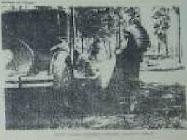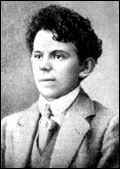Here's something apropos to literary debates, from Robert Musil's Man Without Qualities:
"Ulrich thought privately that it would be just as easy to agree as to argue. Contempt showed as clearly through the politeness as a tidbit in aspic. He knew that Walter would again be annoyed with what he had just said, but he was beginning to long for a conversation with someone with whom he could agree completely, for once. There had been a time when he and Walter had had such conversations: the words are drawn from the breast by some mysterious power, and not one word misses the mark. But when one talks with antipathy the words rise like fog from an icy plain. He looked at Walter without resentment, certain that Walter also felt that the further the conversation went the more it was deforming his inner convictions, but that he was blaming Ulrich for it. 'Everything we think is either sympathy or antipathy!' Ulrich thought. At this moment he was so vividly struck by the truth of this that he felt it as a physical pressure, like the bodily contact of people swaying in unison when they are jammed together. He looked around for Clarisse."
Jordan Davis wrote something on his blog like this (about sympathy/antipathy) about a month ago.
Maybe a kind of Viennese attention to emotional undertones.
There's a neat "Museum of Sound" in Vienna, with an interactive room devoted to the science of harmonics. At one station you experience how any kind of rhythmic drumming, as it increases in speed, begins to sound first like a car engine revving, and then turns into a musical tone (with an ascending pitch). Another station in the same room illustrates how speech sounds - vowels, consonants - have effective overtones & undertones just like music, which among other things activate "color zones" & other responses in the brain (again, as in music).
Gabriel Gudding posted a remarkable statement on "position-taking" while I was gone. May try to excerpt it here; worth quoting. I agree with him 99.9%; or, in other words, I agree with him completely on a certain level, and on another level am in slight disagreement.
I agree with him on the comic (& sometimes tragic) fallibility of all our assertions.
I agree that the internecine poetry wars have an overall effect similar to the one characterized by the Musil quote, above.
Where I disagree, I guess, is the implication (and perhaps I am mistaken in drawing this conclusion from GG's statements) that all this futility should inevitably enjoin unanimity-through-peacemaking. Sometimes differences are unavoidable. Is peace without unanimity a possibility? I think so, if we recognize & acknowledge the inherent value & the contributions of our antagonists.
So, I see how generous Ron Silliman has been, while I was out of the country, to acknowledge my presence in these poetry issues (and Kent's & Gabriel's) despite that fact that I am in sharp disagreement with his "theoretical position".
On one level, my fulminations against "avant-gardism" fall both within the category of Gabriel's general human foolishness (& aggression), & Ron's category of doomed traditionalism (like King Egbert(?) drawing his sword against the sea).
Still, the other side of the coin holds my basic position, which is as follows:
In Democratic Vistas, Whitman exalted the English language for its supple attention to the matter-of-fact, and glorified it as the language of freedom. This concept does not, in my view, put Whitman among the victorious "crazies", as Ron Silliman would have it (in his blog post of Sept 15). Nor does Emily Dickinson's precision & concision read like craziness either. The binary theory of American poetics simply replaces one illusory orthodoxy with another. Gabriel Gudding's prose & poems show repeatedly (through eclectic quotes from "obscure" old authors) how the Old is actually the New. What would be new, for now, to me anyway, would be a poetics of multivalent directness, communicability : a poetry which absorbs & musicalizes the news we read in the paper & the things that happen to us every day; as I wrote months ago on this blog, the Now, as opposed to the New. I hear the inevitable protest that this is a vague edict, which is unfair to the pioneering, testing, resistant avant-garde. But my general point is that poetry is a difficult art : promoting the "experimental", as if it were something you get for joining some school of literary practice, merely befuddles critical response; and I use the example of a possible communicable-real poetry, a poetry of direct address, because this is a value of poetries that the standard US avant-garde would find inimical (such as some of the poetry of the 18th century : Pope, Goldsmith) merely because it comes out of the past and out of a culture concerned with (those evil) "norms". Ron Silliman's characterization of the Houlihan attack as simply another benighted & doomed journalistic sub-defense of the normative Olde Guard is not quite accurate. Houlihan's example of a valuable poem (by Franz Wright) would have been thrown out of court by traditionalists, New Critics, & Language Poets alike, yet it works, because, as she pointed out, it succeeds in communicating (aesthetically) a difficult and authentic reality.
Subscribe to:
Post Comments (Atom)



No comments:
Post a Comment